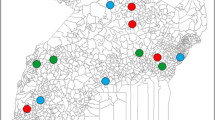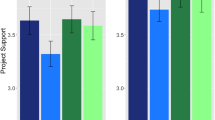Abstract
This research aims to examine how foreign aid affects the recipient public’s view of donors and their own government. Foreign aid is believed to contribute to enhancing the public’s image toward donors, but along with potential externalities regarding the legitimacy of the domestic government. To test this expectation, we conduct a nationwide survey experiment in Indonesia utilizing South Korea’s aid projects in the domains of public health, education, and energy. We find that information about South Korea’s aid significantly improves the attitudes of Indonesian citizens toward the donor, but the informative effect is statistically significant only regarding public health and education. We also find that aid information per se does not affect government legitimacy, although public education and energy aid appear to have positive effects compared to public health aid.



Similar content being viewed by others
Notes
These studies pay closer attention to more nuanced underlying causal dynamics of aid and legitimacy. They expound how such factors as the types of aid projects, public perceptions of donor countries, or state capacities were at play in determining state-society linkage. See Baldwin and Winters (2020), Blair and Winters (2020), and Dolan (2020) for further discussion of this agenda.
For example, citizens may be unlikely to blame their own government for foreign aid if Western donors have responsibility for the underdevelopment of their country.
The actual amounts of funds for public health and electricity aid projects are 5 and 18 million US dollars, respectively.
In 2022, the three new provinces of Central Papua, Highland Papua, and South Papua were separated from Papua, and the new province of Southwest Papua was separated from West Papua.
During the survey experiment, all of the survey questions, except those for the outcome measures, were presented before the display of an experimental vignette.
The possibility that the sample limitation affects the experiment results will be discussed in greater detail in the conclusion section.
These questions were presented only in the manipulation conditions.
We code “I can’t recall it” as an incorrect answer instead of a missing observation.
We rely on regression analysis to address the observed imbalance across the experimental conditions and the heterogeneity of the vignette contents in dimensions other than the project type per se. However, the results of the simple comparison of mean outcome scores across the experimental conditions are also reported in Appendices D and G.
The coefficient on Education is -0.66, and its p-value is 0.067. Meanwhile, the coefficient on the interaction between Project and Education is 0.17, and its p-value is 0.035.
References
Alrababa’h, A. Myrick, R. and Webb, I. 2020. Do Donor Motives Matter? Investigating Perceptions of Foreign Aid in the Conflict in Donbas. International Studies Quarterly 64 (3): 748–757.
Andrabi, T., and J. Das. 2010. In Aid We Trust: Hearts and Minds and the Pakistan Earthquake of 2005. Washington, DC: World Bank.
Baldwin, K., and M. Winters. 2020. How Do Different Forms of Foreign Aid Affect Government Legitimacy? Evidence from an Informational Experiment in Uganda. Studies in Comparative International Development 55: 160–183.
Bates, R., and D. Lien. 1985. A Note on Taxation, Development and Representative Government. Politics & Society 14 (1): 53–70.
Blair, R., and P. Roessler. 2021. Foreign Aid and State Legitimacy: Evidence on Chinese and US Aid to Africa from Surveys, Survey Experiments, and Behavioral Games. World Politics 73 (2): 315–357.
Blair, R., and M. Winters. 2020. Foreign Aid and State-Society Relations: Theory, Evidence, and New Directions for Research. Studies in Comparative International Development 55: 123–142.
Blair, R., R. Marty, and P. Roessler. 2022. Foreign Aid and Soft Power: Great Power Competition in Africa in the Early Twenty-first Century. British Journal of Political Science 52 (3): 1355–1376.
Böhnke, J., and C. Zürcher. 2013. Aid, Minds and Hearts: The Impact of Aid in Conflict Zones. Conflict Management and Peace Science 30 (5): 411–432.
Brass, J. (2010) Surrogates for Government? NGOs and the State in Kenya. Ph.D. Dissertation, University of California, Berkeley, CA.
Brass, J. 2016. Allies or Adversaries? NGOs and the State in Africa. New York: Cambridge University Press.
Bratton, M. 1989. The Politics of Government-NGO Relations in Africa. World Development 17 (4): 569–587.
Cruz, C., and C. Schneider. 2017. Foreign Aid and Undeserved Credit Claiming. American Journal of Political Science 61 (2): 396–408.
Department for International Development (DFID). (2012) New Logo: Flying the Flag for UK Aid.” Press release, 25 June, London, Department for International Development. http://www.dfid.gov.uk/News/Latest-news/2012/New-logo-uk-aid/.
Dietrich, S., and M. Winters. 2015. Foreign Aid and Government Legitimacy. Journal of Experimental Political Science 2 (2): 164–171.
Dietrich, S., M. Mahmud, and M. Winters. 2017. Foreign Aid, Foreign Policy, and Domestic Government Legitimacy: Experimental Evidence from Bangladesh. The Journal of Politics 80 (1): 133–148.
Dolan, L. 2020. Rethinking Foreign Aid and Legitimacy: Views from Aid Recipients in Kenya. Studies in Comparative International Development 55: 143–159.
Dreher, A., A. Fuchs, B. Parks, A. Strange, and M. Tierney. 2021. Aid, China, and Growth: Evidence from a New Global Development Finance Dataset. American Economic Journal: Economic Policy 13 (2): 135–174.
Eichenauer, V., A. Fuchs, and L. Brückner. 2021. The Effects of Trade, Aid, and Investment on China’s Image in Latin America. Journal of Comparative Economics 49 (2): 483–498.
Fishstein, P. and Wilder, A. (2012) Winning Hearts and Minds? Examining the Relationship between Aid and Security in Afghanistan. Medford, MA: Feinstein International Center, Tufts University. https://fic.tufts.edu/assets/WinningHearts-Final.pdf.
Fowler, A. 1991. The Role of NGOs in Changing State-Society Relations: Perspectives from Eastern and Southern Africa. Development Policy Review 9 (1): 53–84.
Goldsmith, B., Y. Houriuchi, and T. Wood. 2014. Doing Well by Doing Good: The Impact of Foreign Aid on Foreign Public Opinion. Quarterly Journal of Political Science 9 (1): 87–114.
Gubser, P. 2002. The Impact of NGOs on State and Non-state Relations in the Middle East. Middle East Policy 9 (1): 139–148.
Guiteras, R. and Mobarak, A. (2014) Does Development Aid Undermine Political Accountability? Leader and Constituent Responses to a Large-Scale Intervention. University of Maryland. http://sites.bu.edu/neudc/files/2014/10/paper_488.pdf.
Harding, R. 2015. Attribution and Accountability: Voting for Roads in Ghana. World Politics 67 (4): 656–689.
Jones, E. (2021). Winning Hearts and Minds or Stoking Resentment? Exploring the Effects of Chinese Foreign Aid on Africans' Perceptions of China. Working Paper.
Knack, S. 2001. Aid Dependence and the Quality of Governance: Cross-Country Empirical Tests. Southern Economic Journal 68 (2): 301–329.
Korea ODA Portal. 2020. Korea ODA Status: Overall Status. Office for Government Policy Coordination, https://www.kodaportal.go.kr/portal/main Accessed August 10, 2021.
Lake, D. 2010. The Practice and Theory of U.S. State-building. Journal of Intervention and State-Building 4 (3): 257–84.
Levi, M. 1988. Of Rule and Revenue. Berkeley: University of California Press.
Moore, M. 2008. Between Coercion and Contract: Competing Narratives on Taxation and Governance. In Taxation and State-Building in Developing Countries: Capacity and Consent, ed. D. Brautigam, O. Fjeldstad, and M. Moore, 34–63. New York: Cambridge University Press.
Nye, J. 2002. The Paradox of American Power: Why the World’s Only Superpower Can’t Go It Along. New York: Oxford University Press.
OECD. 2020. Education at a Glance 2020: OECD Indicators (https://www.oecd-ilibrary.org/docserver/69096873-en.pdf?expires=1685500186&id=id&accname=guest&checksum=604755872238D7F47A0A1C085937E6C4)
Sacks, A. 2011. Credit or Blame: Non-State Provision of Services and Political Support in Africa. Ph.D. Dissertation, University of Washington, WA.
Sacks, A. 2012. Can Donors and Non-State Actors Undermine Citizens’ Legitimating Beliefs? World Bank Policy Research Working Paper 6158, August, Washington, D.C.
Seah, S., et al. 2021. The State of Southeast Asia: 2021. Singapore: ISEAS-Yusof Ishak Institute.
Singh, R. and Williamson, S. 2022. Where Is the Money From? Attitudes toward Donor Countries and Foreign Aid in the Arab World. International Studies Quarterly 66(4).
Statistics Indonesia. 2021. The Indonesian Population Census 2020 Highlights https://unstats.un.org/unsd/demographic-social/meetings/2021/egm-covid19-census-20210209/docs/s03-04-IDN.pdf.
Tendler, J. 1997. Good Government in the Tropics. Baltimore: Johns Hopkins University Press.
Timmons, J. 2005. The Fiscal Contract: States, Taxes and Public Services. World Politics 57 (4): 530–567.
United States Agency for International Development (USAID). 2012. Branding. 19 June, Washington, D.C. (http://www.usaid.gov/branding/)
Whaites, A. 1998. NGOs, Civil Society and the State: Avoiding Theoretical Extremes in Real World Issues. Development in Practice 8 (3): 343–349.
Zürcher, C., Koehler, J. and Böhnke, J. 2010. Assessing the Impact of Development Cooperation in North East Afghanistan 2005–2009. German Federal Ministry for Economic Cooperation and Development, Berlin. http://www.oecd.org/countries/afghanistan/46785983.pdf.
Acknowledgements
We are deeply grateful to Dr. Aditya Perdana for his invaluable and contextually informed comments that have greatly enriched our research. His deep understanding of the Indonesian context and his insightful feedback have played a crucial role in enhancing the quality and relevance of our work.
Funding
This work was supported by the Ministry of Education of the Republic of Korea and the National Research Foundation of Korea [NRF-2020S1A5A2A03045536]; and The Marquette Fellowship and The James C. Carter, S. J. Faculty Fellowship from Loyola University New Orleans. On behalf of all authors, the corresponding author states that there is no conflict of interest.
Author information
Authors and Affiliations
Corresponding author
Additional information
Publisher's Note
Springer Nature remains neutral with regard to jurisdictional claims in published maps and institutional affiliations.
Supplementary Information
Below is the link to the electronic supplementary material.
Rights and permissions
Springer Nature or its licensor (e.g. a society or other partner) holds exclusive rights to this article under a publishing agreement with the author(s) or other rightsholder(s); author self-archiving of the accepted manuscript version of this article is solely governed by the terms of such publishing agreement and applicable law.
About this article
Cite this article
Shin, J.H., Kim, Y.S. & Chang, H.I. Foreign aid, soft power, and domestic government legitimacy: experimental evidence from South Korean aid to Indonesia. Int Polit 61, 343–360 (2024). https://doi.org/10.1057/s41311-023-00497-x
Accepted:
Published:
Issue Date:
DOI: https://doi.org/10.1057/s41311-023-00497-x




